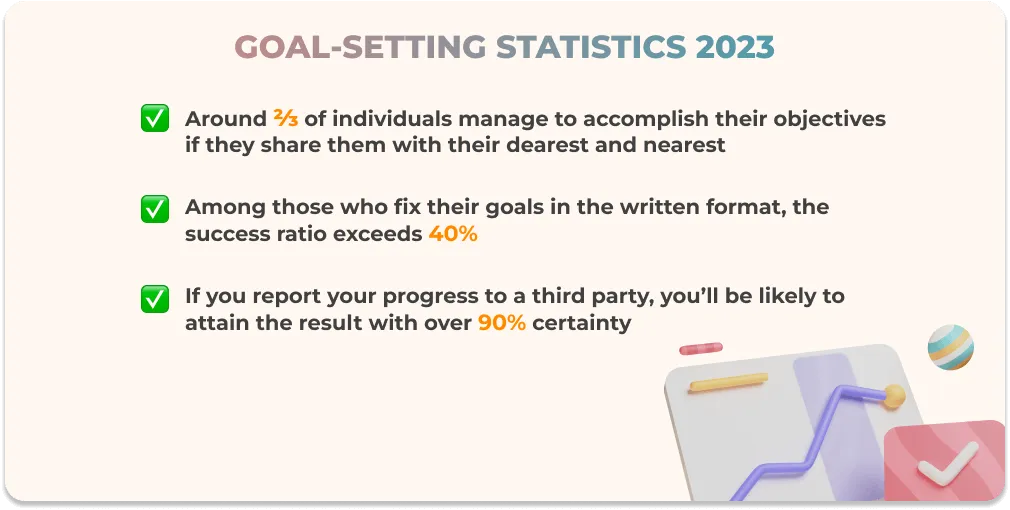
Max Miller
April 10, 2024
Work goals are vital for enhancing your performance. They let you achieve the desired results faster and easier, optimize your resource consumption, and get greater job satisfaction. Statistics prove that after you incorporate this practice into your workflows, your efficiency can skyrocket by 10 times. Only less than 20% of individuals resort to this trick – so if you become one of them, you’ll obtain a meaningful competitive edge! In this article, we’ll explain how to handle the goals. Plus, we’ll share comprehensive goals for work examples that shall come in handy for professionals from various sectors.
Definition and Classification
Goals for work are objectives that you set for yourself. Broadly speaking, you decide on which result you’d like to achieve. If possible, you can also determine why you want to attain it, which tools and methods you’re planning to leverage, and within which time frame it will be realistic to see the outcome.
By their essence, goals can be:
-
Process-oriented. For instance, you strive to integrate innovative technological solutions into your workflows.
-
Performance-oriented. For example, you aim to minimize distractions and work faster.
-
Outcome-oriented. You need to deliver not one but two products per year.
According to other classifications, goals can be categorized as short-term or long-term ones as well as related to your professional or personal development.
Top Method for Formulating Your Goals
Paul Meyer, an entrepreneur, designed the SMART method for setting goals at work. Millions of individuals around the world gladly adopted it. Meyer released a non-fiction bestseller on the topic and created an international organization to motivate people. According to his approach, a perfect goal ticks five boxes.
Specific
Ask yourself:
-
What do I hope to achieve?
-
Why does it matter to me?
-
Will I pull it through myself? Or will I need to involve other people in the process? If yes, whom and what for?
-
What’s the geographical location of my goal?
-
Which tools will I have to leverage?
-
Which challenges and restrictions will I face?
It doesn’t make sense to formulate goals in an abstract manner. It’s essential to clearly visualize the result and the process of achieving it.
Measurable
Think of how to measure your progress:
-
How many days, weeks, months, or years will it take me?
-
How much money will I have to spend?
-
Which indicators will let me know that I achieved the result?
If you can measure your progress step by step, it will keep you motivated and will prevent you from missing your deadlines.
Achievable
In this case, the set of questions includes:
-
What should I do to reach this goal?
-
How realistic is it to accomplish it?
-
Which obstacles will I face on my way?
It’s ok if you need to leave your comfort zone and feel strain. Most importantly, your goal should be attainable. Avoid wasting effort on accomplishments with small odds for success.
Relevant
A goal qualifies as relevant if you can give a positive answer to these questions:
-
Will the result justify the efforts that I invest in it?
-
How does this goal align with the other objectives that I’m currently working on?
-
Is now a good time to move towards it?
-
Am I in a favorable position to meet this goal? Are the circumstances that surround me positive enough?
-
Am I the right person to strive for this result?
This criterion should remind you about the context that surrounds your goal. It doesn’t exist in a vacuum. It needs to fit your life as well as your social, economic, and business environment.
Time-Bound
For this criterion, ask yourself:
-
When can I expect to celebrate the result?
-
What can I do right now to start moving towards it?
-
What can I do at (insert any time moment in the future) to contribute to the achievement?
Such a way of thinking prevents you from bogging down in your everyday chores. Every day, you’ll realize you’re moving forward and will keep focused on your ultimate ambitions.
Examples of Goals for Work
Below, we’ll share a sample list of common goals. They should provide you with a general idea of how to formulate your objectives.
Become an Intern
The target audience of this goal is students and entry-level specialists. Some mistakenly believe that an internship can’t be a full-fledged work goal because it’s not synonymous with being employed. However, landing it is an achievement in itself and shouldn’t be diminished.
Develop a Handy Habit
It can be anything that helps you feel and act better. For instance, you may want to discard coffee and take a cold shower every morning instead to feel energetic. Or, you can go in for jogging together with your colleagues.
Get Rid of Distractions
Detect what distracts you the most from your work and find a way to eliminate it entirely – or at least reduce the time that you waste on it. For example, it can be social media or your smoking habit.
Identify New Challenges in Your Current Position
Sometimes, you crave a promotion but the employer asks you to wait for a couple of months. To prevent boredom, think of what you can do right now to feel more fulfilled. For example, you can take on extra tasks in exchange for cash or another type of remuneration.
Reach the Position That Suits You Best Within the Company
To climb up the career ladder most efficiently, you’d better clearly visualize what you’re heading to and what expects you there. Analyze your skills, experience, and personal traits. Formulate the title of any position that suits you and that you can reach in the foreseeable future. Research the demands for it, its scope of responsibilities, its significance for the company, and its pros and cons. If it’s indeed what you dream of, map a step-by-step path to this position. Maybe, you might need to acquire new skills or get hands-on practice in some fields that are new to you.
Boost the Skills That Are Crucial for Your Professional Growth
Most probably, you rely on an extensive set of hard and soft skills for your work. However, they differ in their potential contribution to your further development. Let’s imagine that you work as a full-stack programmist and can be promoted to the position of team lead. In such circumstances, you should put an emphasis on developing soft skills – such as communication, avoiding and solving conflicts, and empathy. To acquire or enhance them, you can read profile books, attend courses, or hire a mentor for one-to-one classes.
Complete an Educational Course or Program
This goal can be linked to the previous one – but nevertheless, they’re different. It’s possible to boost your skills without attending a course. The primary advantage of completing a program is that you’ll get a diploma or certificate. You’ll be able to mention this document in your CV and it can open new career opportunities to you.
Enlarge Your Network
An extensive professional network is an important pillar in nearly any career. Other specialists who know you personally can offer new jobs and opportunities to you, share advice and contacts with you, and come in handy for many other purposes. To enlarge your network, you can join profile groups and communities as well as attend online and offline events.
Research Your Competition
To excel at your own work, you’d better find out what your competitors do. This recommendation is relevant not only for business owners but for their employees too. If you’re aware of the industry’s best practices, you can integrate them into your workflows. Plus, you can share them with your colleagues and supervisors – and maybe, get a reward for that.
Provide Feedback
Feedback enables professionals to improve and better cater to their target audience. You can learn to deliver it even when it’s not absolutely necessary to. Strive to do it as politely as possible and preserve a positive attitude. Let others know that you will appreciate their feedback on your activities too. By doing so, you’ll confirm that you’re not an indifferent person – but a proactive individual who wants to make the world better. Besides, you’ll prove your ability to assess things impartially and articulate your opinion.
Help with Onboarding Newcomers
This goal suits sociable people who have been working for their employer for a few years already and know the organization inside out. Your mission will consist in accompanying a new staff member during their initial weeks with the company. Be ready to show the newcomer around the premises and get them acquainted with other colleagues. Explain to them the rules of using hardware and software, taking breaks, and answering messages. Surround them with emotional support, so that they feel comfortable and confident at their new workplace. Newcomers will feel grateful – and probably, will be glad to deliver a favor to you in return some time later.
Become a Leader
There are various ways to achieve this goal. For instance, you can lead a team that is working on a product – or encourage your colleagues to take part in charitable projects in their free time. Leadership involves multiple skills, such as problem-solving, communication skills, and the ability to overcome stress. If you prove to be an efficient leader for a specific endeavor, you may end up as a top manager in a few years.
Earn More
To earn more money, you can switch to a new employer, get a promotion, or take on more tasks. Be ready to sacrifice your free time, accept more responsibility, or both. The good news is that the process doesn’t need to be painful. You may focus on the tasks that you genuinely enjoy. Or, arrange a promotion that will not only boost your salary but also expand your development opportunities.
Enhance Your Work-Life Balance
Consider finding a job closer to your home. Consult with a psychologist on any work-related issues that disturb you and outline ways to overcome them. Discuss with your boss an opportunity to work remotely a few days per week.
Try a More Flexible Schedule
If you’re happy with your current job, ask your boss whether you could work from home at least sometimes. If their answer is negative, it shouldn’t be a problem for you to find a remote or hybrid job with favorable conditions. Some people hesitate to switch to remote work simply because they have never tried it before. They suspect their productivity might plummet or they might suffer from being isolated. Fortunately, you can find multiple texts, podcasts, and videos that will help you overcome these issues.
Switch to a New Sector
If you’re fed up with your current job, you can switch to something entirely different – such as becoming a makeup artist after ten years of working in an office. Alternatively, you can try your hand at a niche that is adjacent to the one where you currently work. For example, you can be an accountant and try to become a financial consultant.
Sign a Contract with Your Dream Employer
What does the term “dream employer” mean for you? Is it a company that promotes innovation? Or is renowned for its liberal and employee-friendly corporate culture? Or lets you earn much higher than the industry average? Or provides five-star education opportunities? Narrow down your requirements and make a list of employers who meet your demands. Find out what they expect from their staff and how to reach them.
Launch Your Own Business
This goal can be approached from different sides. For instance, you can try to convert your hobby into a business. It would be smart to try to monetize your hobby without leaving your job first. Alternatively, you can create a business that involves using skills necessary for your current work. For example, if you work as an advertiser, consider launching your advertising agency. Before switching to entrepreneurship, make sure to research the market. Detect the niches with the strongest and weakest competition – avoid the former and try to make money in the latter.
Get Acknowledged as an Industry Expert
When you accumulate enough knowledge, you may feel the urge to share it with others. You can start a blog, take part in profile conferences as a speaker, and launch your own webinars or educational courses. Building your personal brand will take a lot of time and effort – but it will definitely pay back.
Win a Profile Award
Awards can not only please your ego – but also attract public attention to you and open new opportunities for your professional development. To boost your odds of grabbing a meaningful annual award, research its history and analyze by which parameters the jury selected the winners. It’s not enough that the product or project that you submit is of the highest quality. It also needs to precisely meet the selection criteria of the award.
Introduce an Advanced Industry Standard
This example of goals for work suits the most ambitious professionals. Let’s imagine that you’re a cybersecurity expert. One day, you might come up with an innovative technique for encrypting data that will revolutionize the sector.
Tools and Techniques for Monitoring Your Progress
The research showcases compelling results:

Apart from the positive impact of social pressure, you can also employ technological tools. Choose an app that lets you manage your time, tasks, and projects. The most basic solutions won’t allow you to deal with work goals – but more advanced ones will. It’s not necessary to spend large sums of money on them. For instance, LeaderTask, one of the best products in its niche, can cost you from $3.33 per month.
With a dedicated app, you can plan your actions, set up reminders and notifications, monitor your progress, merge your to-dos into lists and projects, and perform a multitude of other actions. The app might be able to visualize your workload in various formats, so that you clearly see what’s coming next and can distribute your resources most rationally.
Many solutions can generate insightful performance reports for you. Based on the accumulated data, you’ll be able to identify your weak and strong points and fine-tune your upcoming activities accordingly. Many apps support collaboration – which is good for those who are planning to assign or delegate tasks to others.
Tips for Success
When getting started, opt for short-term goals – daily and monthly ones instead of their yearly counterparts. Keep them as simple and realistic as possible. After you succeed in achieving the easiest results, you’ll feel proud and motivated to carry on.
Don’t hesitate to ask for help if you realize that something fails to function as you expected. Discuss your situation with someone whose opinion you value. It would be ideal if this person works or worked for the same employer as you. They will be able to see your circumstances from a different perspective, which often helps.
A common mistake consists in setting goals and forgetting about them until the deadline when you hope to get the result. Instead, after drafting the path for achieving the result, split it into smaller components. Review your progress after reaching each milestone – or after each fixed period of time. If needed, adjust your goals – for instance, allocate more resources for achieving them or give yourself more time.
Conclusion
Professional and personal goal setting at work can help you perform better, earn more money, enjoy greater job satisfaction, and build your career in the most opportune way. To make the most of your objectives, make sure they are achievable, write them down, and share them with others. Consider installing an app to manage your time and tasks! It will let you visualize your objectives, split them into smaller steps, and track your progress. One of the top solutions in this niche is called LeaderTask. It’s user-friendly, versatile, and rich in features. It should help you become an achiever in any chosen field.







